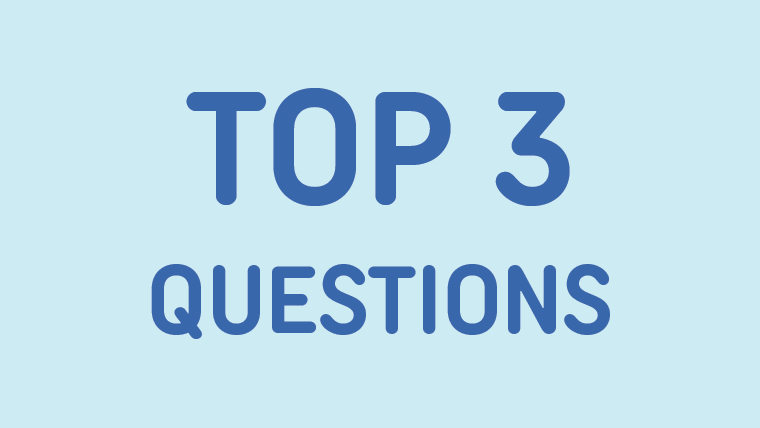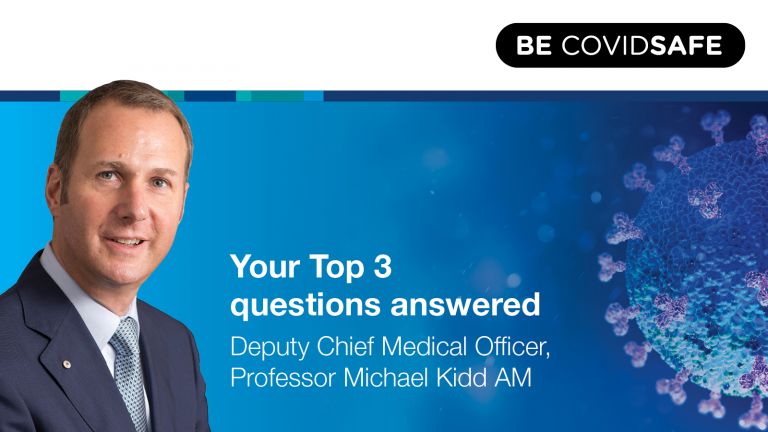
Hello, and welcome to today’s Top 3. My name is Michael Kidd. I’m Deputy Chief Medical Officer with the Australian Government Department of Health. Joining me today is Linda my Auslan Interpreter. Today is a special day. It’s the International Day of Sign Languages. So, I have a message for Linda and everybody who is following us using Auslan. Happy World Sign Language Day. My shout-out today is to the health care workers of Australia. The doctors, nurses, allied health workers, pharmacists, Aboriginal health workers, everybody who is working in healthcare right across the country, supporting the health and wellbeing of the people of our nation. And, of course, many of our health workers are directly involved in providing services related to the COVID-19 pandemic, including, of course, testing of people for COVID-19 and also our national COVID-19 vaccination program, one of the largest logistical exercises we have ever seen in Australia’s history. So thank you to the healthcare workers of Australia for all that you are doing to keep all of us safe and well.
So, to your Top 3 questions and your first question today is why do I need to still get tested for COVID-19 even if I only have mild symptoms of cold or flu?
So the answer is, you need to get tested if you have symptoms of cold or fever or flu, no matter how mild. You don’t know when you’ve got these symptoms, whether it might be COVID-19 or it might be another cause for your symptoms and it’s very important, even at this stage in the pandemic, that we are not missing cases of COVID-19. That we are picking-up every case and making sure that we are not seeing further spread of COVID-19 into the community, including, of course, the risk of spreading COVID-19 to people who have not yet been able to be vaccinated and protected against becoming seriously unwell with COVID-19. And that, of course, includes all the children of Australia aged under the age of 12 years and anyone else who, for medical reasons, is not able to be vaccinated. Even if you have received two doses of the COVID-19 vaccine, if you develop symptoms of cold or fever or flu, please still arrange to get tested so that we can make sure that you don’t have COVID-19 and we can make sure that we are protecting everyone in the wider community. Testing remains an essential part of our national response to the pandemic and helping to keep outbreaks under control.
The second question today is are the COVID-19 vaccines the same for adults and for children?
And the answer is yes, we are using exactly the same vaccines for both adults and for children. Now, for children aged 12 years and above, we now have available both the Pfizer vaccine and the Moderna vaccine, the Moderna vaccine which has started to be distributed through pharmacies in many parts of Australia over the last week. For anyone aged 18 and above, we have the AstraZeneca vaccine, which is also available in addition to the Pfizer vaccine and the Moderna vaccine. So it’s the same vaccines being used, the same Pfizer and Moderna vaccines being used, for those under 18, those aged between 12 and 18, as we’re using in adults as well. A reminder that we have now nearly 10,000 locations where COVID-19 vaccines are being administered through general practices, through pharmacies, through our Commonwealth vaccination centres, and through the hubs, which have been established by the States and Territories. If you want to find out where you can get a COVID-19 vaccine, please go to health.gov.au, look at the Vaccine Eligibility Checker, and if you put in your postcode, you’ll be able to find all the sites closer to you where you can make an appointment and then go and receive your COVID-19 vaccine. It’s very important, as we continue to emphasise, that everyone aged 12 and above in Australia is vaccinated against COVID-19, because the vaccines will protect you from becoming seriously unwell from COVID-19 if you do get infected.
Your third question is around the benefits of getting a COVID-19 vaccine for people who are pregnant compared to the risks if pregnant women were to become infected with COVID-19.
We know that pregnant women are at increased risk of becoming seriously unwell if infected with COVID-19. We also know that COVID-19 infection in the mother puts the unborn baby at increased risk as well. There is a risk of premature labour, the baby being born too early, and all the complications which arise from babies being born prematurely. This is why we have prioritised vaccination for women who are pregnant, and the Pfizer and the Moderna vaccines are available to women who are pregnant right across the Australia. We also have advice from the Australian Technical Advisory Group on Immunisation, ATAGI, our nation’s experts on vaccination, that the vaccines are safe for women who are pregnant and for their unborn babies, and also the vaccines are safe for people who are planning pregnancy and also for mothers who are breastfeeding. So if you’re pregnant and you haven’t yet had your COVID-19 vaccine, I encourage you to get vaccinated. This will protect you and it will also protect your unborn baby.
And that’s our Top 3 questions for today. Thank you for joining us, thank you as always for the questions, which you have been putting to us so that we can provide answers to you. Have a great day everybody.
Top 3 questions
- Why do you need to get tested even if you only have mild cold and flu symptoms?
- Is the COVID-19 vaccine the same formula for adults and children?
- I’m pregnant, what are the benefits of getting the COVID-19 vaccine compared to the risk getting sick if I catch COVID-19?









